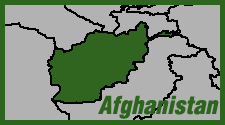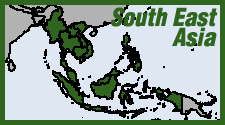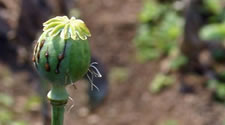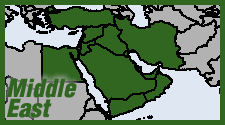 In a "worrying reversal" for global anti-drug efforts, the latest annual report from the United Nations Office for Drug and Crime (UNODC) finds that opium cultivation in Afghanistan increased 43% over the past year—with a total estimated yeild of 4,800 tons compared to 3,300 tons in 2015, The area under poppy cultivation increased 10% according to the report—clocking in at 201,000 hectares (496,681 acres), up from 183,000 hectares (452,200 acres). Simultaneously, there was a 91% decrease in eradication across the country—with no eradication reported at all in the top producing provinces. "It is very disturbing to see a considerable increase in poppy cultivation in the north which may be linked with a deteriorating security situation in the region," said Andrey Avetisyan, UNODC's chief in Afghanistan, at an Oct. 23 Kabul press conference.
In a "worrying reversal" for global anti-drug efforts, the latest annual report from the United Nations Office for Drug and Crime (UNODC) finds that opium cultivation in Afghanistan increased 43% over the past year—with a total estimated yeild of 4,800 tons compared to 3,300 tons in 2015, The area under poppy cultivation increased 10% according to the report—clocking in at 201,000 hectares (496,681 acres), up from 183,000 hectares (452,200 acres). Simultaneously, there was a 91% decrease in eradication across the country—with no eradication reported at all in the top producing provinces. "It is very disturbing to see a considerable increase in poppy cultivation in the north which may be linked with a deteriorating security situation in the region," said Andrey Avetisyan, UNODC's chief in Afghanistan, at an Oct. 23 Kabul press conference.

 The White House has
The White House has  To little fanfare, President
To little fanfare, President  As the new year opened, the Taliban pushed deeper the Sangin district of Afghanistan's Helmand province, with the Afghan army struggling to retake territory newly won by the insurgents. Kabul has sent reinforcements, but as
As the new year opened, the Taliban pushed deeper the Sangin district of Afghanistan's Helmand province, with the Afghan army struggling to retake territory newly won by the insurgents. Kabul has sent reinforcements, but as  Oxford University scholar
Oxford University scholar 





Recent comments
1 week 6 days ago
1 week 6 days ago
5 weeks 5 hours ago
5 weeks 6 days ago
9 weeks 6 days ago
13 weeks 5 days ago
17 weeks 5 days ago
18 weeks 3 days ago
28 weeks 3 days ago
32 weeks 4 days ago